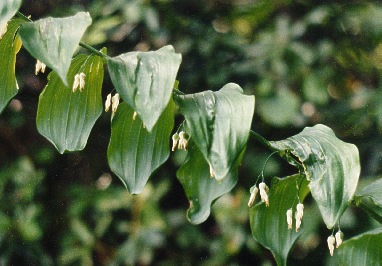
Smooth Solomon's Seal
Polygonatum biflorum
Lily Family (Liliaceae)

Blooms April - June
Polygonatum biflorum, or Smooth Solomon's Seal, is commonly found in dry to moist wooded areas where the soil is rich. It is widespread in eastern North America and found throughout most of North Carolina. This perennial stands one to three feet high at maturity, producing small, white, bell-shaped flowers that hang from the leaf axils largely in pairs. Solomon's Seal blooms from April until June, giving way to bluish-black berries August through October.

NC Range of Smooth Solomon's Seal
In the winter when the leaf stalk dies back and becomes completely removed from the rhizome, a scar remains which is said to resemble the Seal of King Solomon, who reined as King of Israel from 961 - 931 BC. The seal is a hexagram composed of two overlapping triangles to create a six pointed star, commonly called the Star of David after King David, father of Solomon. The seal became synonymous with Solomon who apparently used the symbol to cast away demons and summon angels.
The rhizome itself is edible, and was commonly harvested by early colonists and American Indians. Other historic medicinal uses of Solomon's Seal primarily revolve around the root. Root tea was made for a wide variety of ailments ranging from indigestion to coughing. A poultice was also prepared from the roots, and applied topically for cuts and bruises.
The leaves of this variety are smooth on both sides, a characteristic which distinguishes P. biflorumfrom P. pubescens, or Hairy Solomon's Seal, which has hairs underneath the leaf. Hairy Solomon's Seal has a much smaller distribution range and is only found in a few of our mountain counties.